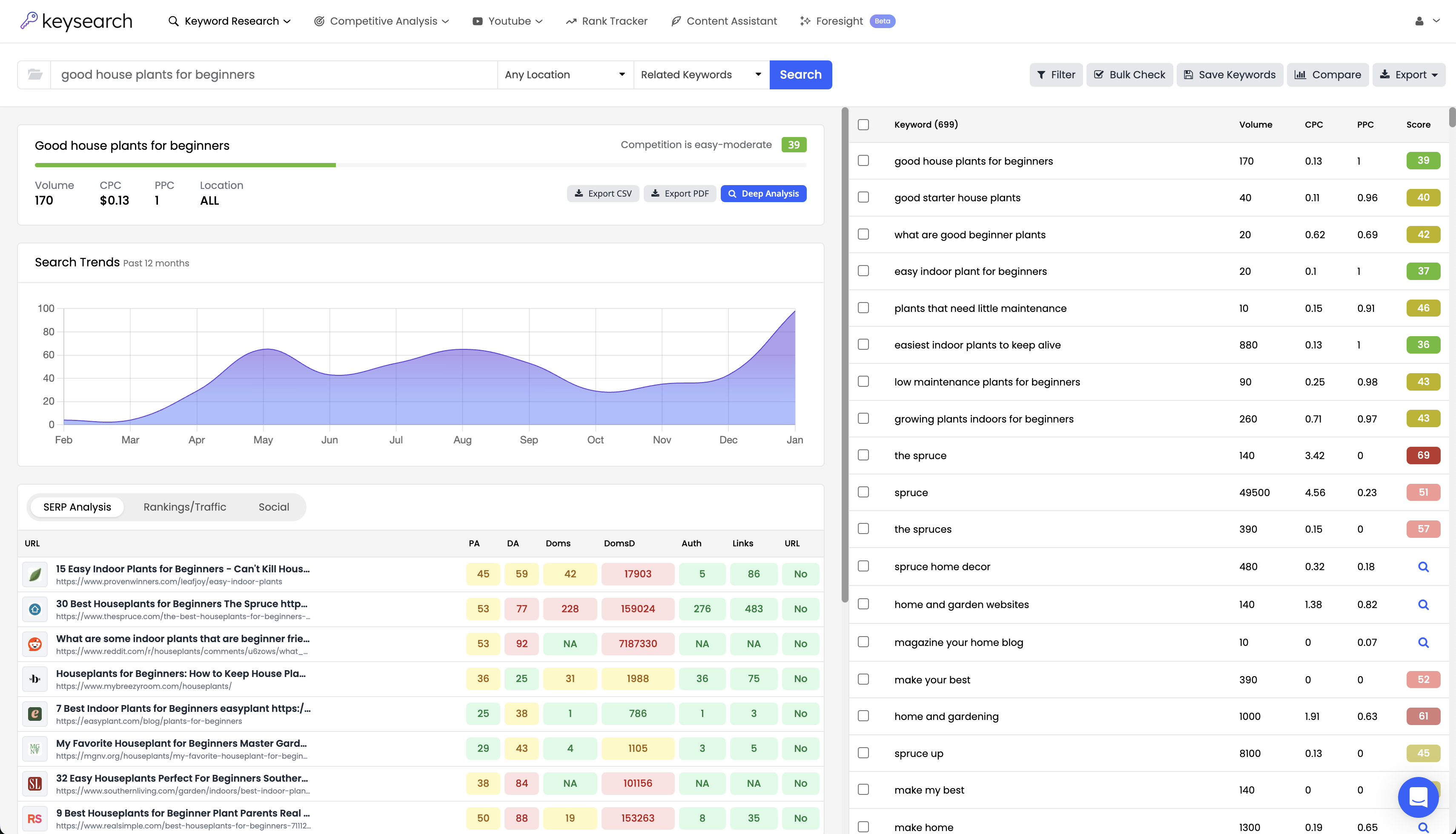The SERPs can be a brutal place to try and compete with bigger, more established sites as a new player with little to no authority. That’s why finding niche keywords is so important.
These are great opportunities for you to start stacking small wins that can compound into big traffic jumps over time. You are targeting far more specific phrases which means the relevancy of searchers is higher, too, leading to more conversions.
We’ll show you how to find niche keywords below, from gathering a list of the top keywords in your niche and chiseling away to uncover the diamonds in the rough. The best way to get started is with our free SEO tools here at Keysearch.
You can use our niche finder to hit the ground running and then use our long tail keyword generator to map out your strategy. We also have other tools to set you up for success with niche keyword research. Join 10,000+ individuals who rely on Keysearch today!
What are Niche Keywords?
Before we get into tips on finding niche keywords, what separates these from your standard keyword opportunities? These are more specific, targeted phrases that cater to a distinct segment of a larger market.
Unlike broad keywords, which aim to attract a wide audience, niche keywords are associated with a highly targeted audience interested in a particular topic, product, or service.
These keywords are often longer and more detailed, known as long-tail keywords, and they usually have lower search volumes but higher conversion rates due to their specificity.
Examples of Niche Keywords
For example, say you sell running shoes. Trying to tap into that broad market would be next to impossible – at least, when first starting out. You’d be competing against Nike, Adidas, etc.
Instead, you could get far more precise and target “Trail running shoes for women”, “Best running shoes for flat feet”, or “Lightweight running shoes for marathons” – whatever aligns with your specific product USP.
Or maybe you’re simply trying to start a niche site with the goal of converting traffic into ad dollars, or eventually running affiliate links. Instead of starting a “running” blog, you could niche down and create content around running in a specific region, or running with a certain condition – you get the point.
In essence, niche keyword research is all about zooming in to be laser-specific with your targeting. But why is this the way to go when higher-volume keywords exist?
The Importance of Niche Keyword Research
Even if you have the authority to compete with bigger sites, niche keywords are a great opportunity for anyone.
People searching with niche keywords are often closer to making a purchasing decision. For instance, a user searching for “organic skincare for acne-prone skin” is likely more ready to buy than someone searching for “skincare.”
Of course, the lower competition of these keywords is compelling as well. They’re easier to rank higher for in search results, which is especially beneficial for small businesses or new websites.
Over time, dominating a niche will build up your site’s authority in the eyes of Google or other search engines. This will give you the power to start going after more competitive keywords. But, you need to first become a big fish in a small pond. So, let’s get into how to find niche keywords below.
How to Find Niche Keywords: Step-by-Step Guide
We’ll walk you through finding niche keywords on autopilot using our intuitive SEO tools below – but you’ll also learn other ways to conduct niche keyword research. First, you need to figure out your niche if you haven’t already.
Figure Out Your Niche if You Haven’t Already
If you’re starting from square one and just know that you want to start a website – but aren’t entirely sure where to begin this journey – that’s perfectly fine! We have a niche finder tool that will help you hit the ground running with confidence.
You could also brainstorm ideas by thinking about what you’re passionate about and/or have pre-existing knowledge on that could give you an edge in creating content or products.
Remember to dig deep in choosing a niche. Don’t go as broad as “golf”. Even “golf for beginners” is too wide a net to cast. Instead, go with “golf in [insert region]”, “golf apparel reviews”, or something way more specific.
Just be sure to validate your niche through research. While you shouldn’t be scared away by low search volume, there has to be some number of people searching for the type of content you want to create.
Gather a List of Niche Keywords Using Our Tool
Now comes the fun part of actually learning how to find niche keywords. It’s quick and easy with Keysearch, the most comprehensive and affordable SEO toolkit on the market.
Begin by entering broad terms related to your niche into Keysearch. For example, if your niche is “organic skincare,” your seed keywords might be “organic moisturizer” or “natural face wash.”
From there, our tool will generate a list of related keywords based on your seed terms. These suggestions will feature plenty of broad keywords, but your goal is to narrow down the long-tail keywords that more closely align with your specific niche.
You can extract this list, and then put in other seed keywords and see what the tool comes up with. The more data you have from this step, the more opportunities you’ll uncover in the next step when you start refining. That’s where the real magic of niche keyword research comes in.
Filter Your List for Relevancy, Competition, and Search Volume
After gathering a broad list of niche keywords you’ll need to put them through a strict set of criteria for relevancy, competition, and search volume.
The specific balance you aim for between these three factors will vary, but relevancy should always be your top priority when finding niche keywords specifically.
Go down the list and remove anything that isn’t ultra-specific to your niche. You may be able to rank for irrelevant keywords, but what’s the point? The most common outcome is that if you don’t have relevancy, you won’t rank in the first place and you’ll be wasting resources.
Many of these niche keywords will inherently be lower difficulty, but you still need to prioritize the lowest-hanging fruit so you can start generating some wins early on.
So, what is a good keyword difficulty score? If you don’t have any authority for your site yet, don’t bother targeting any keywords over a KD of 30. You can save these for later on down the road as you build up relevancy and authority.
We saved search volume for last because, contrary to popular belief, it’s actually the least important as far as niche keyword research goes. Remember, these are going to drive way more targeted traffic with a greater likelihood of converting.
So while the volume may be low, the efforts will still drive results. Still, you need to see some level of volume to justify allocating resources towards a keyword.
Anything above 10-50 searches a month is a good starting point, but don’t be afraid to try and target keywords below this – you’d be surprised how many people actually search these phrases relative to what a search tool says!
We make it easy to sort and filter your keywords based on all these criteria here at Keysearch. You can streamline the process with our keyword difficulty checker, keyword clustering tool, LSI keyword generator, and other tools in our arsenal.
For more insights on filtering your niche keywords, read our keyword research checklist or learn how to automate keyword research in our blog. In the meantime, let’s look at how to find niche keywords in a few other ways.
Other Ways to Go About Finding Niche Keywords
There’s no question that Keysearch is the #1 approach to finding niche keywords – and it’s free, so what’s holding you back? However, there are many other methods for uncovering opportunities. We want to highlight a few of these below:
- Utilize Forums and Online Communities: Observe the language and questions used by participants to discover potential niche keywords.
- Leverage Social Media Platforms: Follow relevant hashtags and trends on platforms like Twitter, Instagram, and LinkedIn to reveal niche-specific keywords worth exploring.
- Explore Google Autocomplete and Related Searches: Start typing your seed keywords into Google’s search bar and observe the autocomplete suggestions. These are based on popular search queries and can be a goldmine for niche keywords.
- Analyze Competitor Websites: Find websites that operate in your niche and analyze their content and keywords to understand what’s working for them. We have a competitor analysis tool in Keysearch to facilitate this.
However you go about finding niche keywords, all that matters is you’re focusing on relevancy, filtering for difficulty, and ensuring some level of search volume. Understanding what to do after keyword research is just as important, though.
Executing Your SEO Strategy
Now it’s time to take your niche keyword research and turn it into action. Actually executing your SEO strategy involves a number of moving parts – from content creation to on-page optimization, link building, and more.
As a small site just starting out, don’t get bogged down with technical SEO – focus on the things that really move the needle. That is content creation and link building.
If you already have existing content on your site, begin optimizing it accordingly, mapping out keywords to specific URLs. If you’re starting from scratch, great – prioritize your list of opportunities based on relevancy, difficulty, and search volume to come up with your next steps.
Focus on creating valuable, informative content that addresses the specific needs and questions of your target audience. Analyze what’s ranking for the keyword in question and see how you can improve it to better satisfy user intent.
Keywords should be strategically placed throughout the content, including:
- Headings
- Body
- URL
- Meta title/description
- Image alt text
Use our keyword density checker to avoid keyword stuffing, as there is a fine line between optimization and overdoing it, coming off as spammy to search algorithms.
Then, start acquiring backlinks to the URLs you want to rank for, varying up the anchor text with a blend of exact match, phrase match, naked, etc.
You should have rank tracking set up throughout the process to gauge how your efforts are paying off. This will help you see which types of keywords are providing the biggest lift so you can prioritize the rest of your opportunities accordingly. Again, this is something we support in Keysearch.
Finding Niche Keywords is Quick and Easy With Keysearch!
Learning how to find niche keywords can be as simple as a few clicks with Keysearch. We pull data from a variety of sources to offer the most up-to-date, accurate information possible, setting you up for success along this SEO journey.
You can generate a vast list of niche keywords from just a few seed terms. The intuitive interface and advanced filtering options enable you to narrow down your list to the most effective keywords for your specific niche.
Our comprehensive keyword research tool is designed to provide you with a wealth of data, including search volume, keyword difficulty, and relevance, allowing you to make informed decisions without any stress or guesswork.
Whether you’re targeting long-tail keywords or looking to uncover hidden gems through competitor analysis, Keysearch has got you covered.
You can also get more specific with your niche keyword research based on the platform you’re trying to rank on. For example, we have the following tools to get more precise keyword data:
- Amazon keyword tool
- eBay keyword tool
- Etsy keyword generator
- Pinterest keyword tool
- YouTube keyword tool
We also have content editing tools, rank tracking, competitor analysis, and more to round out your SEO toolkit. This is truly everything you need in one place, and many of our tools are free to start out!
So, get set up today and see why we’ve earned a 4.9/5 star rating across hundreds of testimonials. Make niche keyword research as quick and easy as possible with Keysearch!
Wrapping Up Our Niche Keyword Research Guide
Finding niche keywords is essential for attracting a targeted audience, reducing competition, and driving higher conversion rates – especially for smaller sites, but any site for that matter.
It’s as simple as inputting a seed keyword and narrowing down the most lucrative long-tail opportunities that align with your niche from a relevance standpoint. From there, you can filter for difficulty and search volume and execute your SEO strategy accordingly.
We have additional resources on conducting niche keyword research for specific platforms, like how to do Etsy keyword research, how to do Pinterest keyword research, how to do keyword research for YouTube, and more. You can also see how our tools stack up to the alternatives:
Otherwise, it’s time to hit the ground running now that you know how to find niche keywords on autopilot with Keysearch. Start your journey on the right foot with the best tools today!
- How to Do Keyword Research for Free: Best Free Keyword Research Tools in 2024 - December 13, 2024
- Benefits of Keyword Clustering: Why is it Important to Group Relevant Keywords Together? - December 13, 2024
- What is Keyword Density in SEO and Its Importance - December 13, 2024







